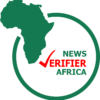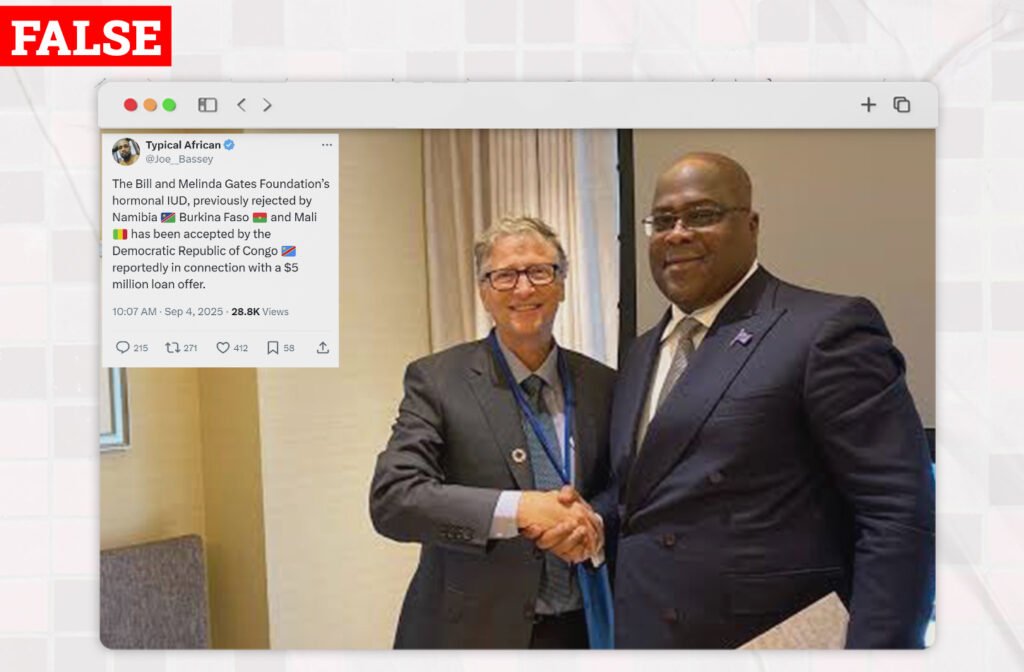CLAIM: DRC Receives $5 Million Loan Linked To Hormonal IUD From The Gates Foundation
Kingsley Okon
On September 4, 2025, an X user Joe_Bassey claimed that the Bill & Melinda Gates Foundation’s hormonal IUD, previously rejected by Namibia, Burkina Faso, and Mali, has been accepted by the Democratic Republic of Congo, DRC, and reportedly tied to a $5 million loan. The post had an image of Bill Gates and the President of the DRC Félix Tshisekedi having a handshake, with a caption; “The Bill and Melinda Gates Foundation’s hormonal IUD, previously rejected by Namibia 🇳🇦 Burkina Faso 🇧🇫 and Mali 🇲🇱 has been accepted by the Democratic Republic of Congo 🇨🇩 reportedly in connection with a $5 million loan offer”.
This claim has reached over 28,000 people.
VERIFICATION
NV-A ran the image through Google Lens, and the results show that it first appeared about five years ago, in September 2019, when the DRC President visited Bill Gates in New York to discuss various cooperation initiatives between the DRC and the Bill & Melinda Gates Foundation. The same image was also published here.
The hormonal intrauterine device (IUD) is a long-acting reversible contraceptive that releases levonorgestrel. It is widely used globally but less available in many low- and middle-income countries, most especially in Africa. Meanwhile, an intrauterine device (IUD) is a form of birth control that a healthcare provider inserts into your uterus. Once it’s inserted, an IUD can prevent pregnancy for up to 10 years or more, depending on the specific type.
NV-A found that the Bill and Melinda Gates Foundation funds the research on the Scale-up of the Hormonal IUD in New and Emerging Markets, SHINE project. This project is led by Family Health International, FHI 360 and the research focus is on Kenya, Malawi, and Nigeria. According to FHI 360, this is a four-year project from 2022 to 2026 to generate evidence that will inform the introduction and scale-up of the hormonal IUD and support future introduction of similar family planning methods.
CLAIM 1: Did Namibia, Burkina Faso And Mali Reject The Bill And Melinda Gates Foundation’s Hormonal IUD
VERIFICATION
In a statement by Namibia’s Presidential spokesperson, Jonas Mbambo, he denied that President Netumbo Nandi-Ndaitwah rejected a proposal from the Bill and Melinda Gates Foundation to conduct a trial of an eight-year hormonal intrauterine device (IUD) in Namibia. He clarified that no such proposal was ever submitted to or discussed by the Namibian government. This claim was also firmly debunked on the Namibian Presidency official X account.
There are also no official report, record or official statement to ascertain that Burkina Faso and Mali were given the proposal to host such a program and publicly rejected the Gates Foundation’s IUD initiative.
VERDICT
The claim that Namibia, Burkina Faso, and Mali rejected the Bill and Melinda Gates Foundation’s hormonal IUD is FALSE. Findings show that none of these countries received such a proposal.
CLAIM 2: DRC Accepted The Hormonal IUD Tied To A $5 million Loan
VERIFICATION
The Bill and Melinda Gates Foundation has provided grants to organisations working in the DRC on family planning and women’s health. In 2022, the Gates Foundation awarded $4.6 million to Tulane University to support family planning programs in the DRC. However there is no record of loan provision for the DRC Government tied to Hormonal IUD.
Meanwhile, the DRC is not listed as a trial or implementation country on the SHINE project, and the DRC government is yet to make any comment regarding the claim.
VERDICT
The claim that DRC received a loan from the Bill and Melinda Gates Foundation is FALSE. There is no report of such a transaction.
CONCLUSION
The claim that the Democratic Republic of Congo accepted the Gates Foundation’s hormonal IUD in connection with a $5 million loan is FALSE. The Gates Foundation’s hormonal IUD project (SHINE) is active only in Kenya, Malawi, and Nigeria, not in the DRC. The reference to Namibia, Burkina Faso, and Mali rejecting the IUD initiatives is also FALSE. Namibia officially debunked its involvement in the program and there is no record of the other countries engaging in any related talks with the Foundation.





